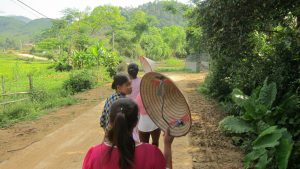A simple street-side dinner in Hanoi costs about 30,000 dong. A few people, a couple of beers, and you're quickly into hundreds of thousands. A months rent is probably 5 million plus. Sounds like a lot, but it's actually not, and while there is probably a reason, so far nobody has been able to explain to me very well the rationale for not just taking three zeros off everything and going from there.
After consistently mixing up my ten-thousand and hundred-thousand notes for the first few days after arriving (oh, yes, sorry, five zeros, not four ... xin lỗi, chị), it's been pretty easy to get into the hang of the denominations and converting back to euros. (At the moment, 1 euro is somewhere around 25,000d, so your noodle-soup dinner sets you back just a little over a euro.)
The wad of notes and squinting at zeros in the early hours dim-lit back of a taxi may soon be a thing of the past though as Vietnam has set its sights on becoming a (almost) cashless society by 2020. That seems like a big leap to make. Until quite recently many people here didn't have bank accounts, and it is still a common practice to buy gold for the hidden stash in the back yard as a way of saving (outside of the banking system and sidestepping inflation losses).

The rate of smartphone use in the country is rising rapidly and this will be a big factor in enabling the transition. It also introduces huge potential in the area of agricultural innovation - whether in relaying weather and pricing information, or providing access to practical knowledge on cultivation techniques or husbandry. Examples of how ICT can have a transformative impact on the lives of farmers are already being seen around the world:
ICT based agro-advisory services in Climate-Smart Villages in Nepal
In fact, if agriculture is going to have any hope of playing its part in reaching the 2 degree target of the Paris Agreement, it is widely acknowledged that an improved knowledge dissemination infrastructure will be an essential part of the process. In writing on the huge challenge, Eva Wollenberg et al say that:
Strong technical assistance for farmers, including farmer innovation hubs, two-way technical support via cell phones, web-based information portals, and farmer-to-farmer exchange, will be essential to foster changes in behavior and locally relevant options.
The photovoice project in My Loi strives to be a small part of this (farmer-to-farmer exchange, locally relevant options) but it is clear that major innovations are required if the roll-out of CSA practices introduced to climate-smart villages is to take place on an impactful scale.
